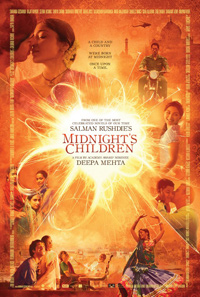Changeling Game: Mehta’s Latest a Stodgy, Swollen Adaptation
 A fictional narrative that attempts to recuperate an impressive fifty year historical timeline concerning relations between India and Pakistan, Deepa Mehta’s latest film, Midnight’s Children, is based on the celebrated novel by Salman Rushdie. In an effort to retain the magical essence of the film, Rushdie adapted his own novel for the screenplay, which unfortunately turns out to be more a curse than a blessing to the final product. While Mehta spins a satisfying set-up during the first half of the film, things fall miserably apart when our childhood protagonist reaches adulthood, and the attempt to turn this into the epic historical drama centered on catalyzing magical realism fails on all counts, and instead we are treated to a cornball rehash along the lines of Forrest Gump.
A fictional narrative that attempts to recuperate an impressive fifty year historical timeline concerning relations between India and Pakistan, Deepa Mehta’s latest film, Midnight’s Children, is based on the celebrated novel by Salman Rushdie. In an effort to retain the magical essence of the film, Rushdie adapted his own novel for the screenplay, which unfortunately turns out to be more a curse than a blessing to the final product. While Mehta spins a satisfying set-up during the first half of the film, things fall miserably apart when our childhood protagonist reaches adulthood, and the attempt to turn this into the epic historical drama centered on catalyzing magical realism fails on all counts, and instead we are treated to a cornball rehash along the lines of Forrest Gump.
Narrated by Rushdie, serving as the omniscient voice of main character Saleem (Darsheel Safary as a child; Satya Bhabha as an adult), we learn that he was born at the stroke of midnight in 1947, a magical hour since this is the historical day when India declared it’s freedom from England. We backtrack to 1917, the time of Saleem’s grandfather, Dr. Aziz (Rajat Kapoor), and the courting of his wife. He has three daughters, and their history, as well as their position as a Muslim family in India are important details establishing why Saleem’s story comes to be. As he is born, the child of a poor gypsy couple is also born, and a nurse (Seema Biswas), inspired by political ideologies, switches the babies, and thus, a rich child is raised by poor folk, and Saleem comes to be raised by his wealthy parents. Saleem’s childhood is shown to be a troubled one, seemingly at odds with his father, who can’t see his resemblance in his son with the “cucumber” nose.
Additionally, he hears voices in his head, which turn out to be the souls of all the children born around midnight in 1947. Those born closer to the hour, such as Saleem and his changeling double, Shiva (Siddarth), have more power, and Saleem is the only one able to call them all together. A school incident revolving around Saleem’s mixed race brings to light that he doesn’t share the same blood type as his parents, resulting in his being sent to live with his mother’s sister in Pakistan. Once he reached adulthood, world events begin spinning out of control, including two wars, the creation of Bangladesh, and a vicious dictator, The Lady (Sarita Choudhury), who targets the Midnight Children for eradication as they represent a threat to her power.
While Mehta’s adaptation is beautifully filmed by cinematographer Giles Nuttgens, with whom she collaborated on her amazing Elements Trilogy, there’s a hollow, forced air about the material as we’re not led to feel much for our main characters, which is particularly evident in the rather unflattering characterization of Saleem, flatly portrayed as an adult by a prosthetically beaked Satya Bhabha. Midnight’s Children builds itself nicely but once the children of midnight are introduced, a la a technique we’ve seen practiced by Professor Charles Xavier, the forthright tone preceding all this magical realism can’t seem to adequately make room for such fantastical elements, which even includes witchcraft in the character of Parvati (Shirya Saran). By the time Saleem Rip Van Winkles his way through two wars and some unfortunate family traumas, you even forgive Mehta and Rushdie for prancing over late coming interests like Choudhury (or even Charles Dance earlier in the film). Midnight’s Children is simply too long, too glossy, and too safe to reach the epic level it seems to be attempting, which seems strange as, looking back on their previous works, neither director nor author is a stranger to controversy. Perhaps the key here is the title, for midnight’s children never quite mature to relevance.


